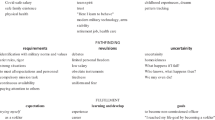Abstract
Veterans and students enrolled in military-sponsored programs, such as the Health Professions Scholarship Program and National Guard, are joining civilian medical and other health professions schools in increasing numbers. This study aimed to explore the particular needs and perspectives of military students at a US civilian medical allopathic school. In October–November 2012, two focus groups with military medical students were conducted using a semi-structured interview guide. Focus groups were digitally recorded and transcribed. Transcripts were analyzed through an inductive iterative review and recurring themes were identified. Seven (44% of all eligible) military medical students participated in the focus groups. The main themes that emerged from focus groups included leadership, camaraderie, pros and cons of early identification, the need for flexibility in the curriculum to accommodate military duties, anxiety regarding the military match, the need for information and resources, the need for stage-appropriate mentorship, uncertainty about the future, and the need for additional support for veterans. Further research is warranted to explore military student perspectives in more depth and help create an inclusive learning environment, where all military students feel valued and adequately supported.
Similar content being viewed by others
References
American Association of Physician Assistants. Become a PA. https://www.aapa.org/career-central/become-a-pa/. Accessed December 20 2017.
Association of American Medical Colleges. (2015). Applicants and Matriculants Data. https://www.aamc.org/download/321460/data/factstablea3.pdf. Accessed 29 May 2017.
Association of American Medical Colleges. (2017a). Applying as a veteran or current military member. https://students-residents.aamc.org/applying-medical-school/article/applying-veteran-or-current-military-member/. Accessed 29 May 2017.
Association of American Medical Colleges. (2017b). Loan Repayment/Forgiveness and Scholarship Fact Sheet. Scholarship/US Air Force. https://services.aamc.org/fed_loan_pub/index.cfm?fuseaction=public.program&program_id=108. Accessed 19 Dec 2017.
Blais, R. K., & Renshaw, K. D. (2013). Stigma and demographic correlates of help seeking intentions in returning service members. Journal of Traumatic Stress, 26(1), 77–85.
Borsari, B., Yurasek, A., Miller, M. B., Murphy, J. G., McDevitt-Murphy, M. E., Martens, M. P., et al. (2017). Student service members/veterans on campus: Challenges for reintegration. American Journal of Orthopsychiatry, 87(2), 166–175.
Brock, D. M., Bolon, S., Wick, K., Harbert, K., Jacques, P., Evans, T., et al. (2013). The military veteran to physician assistant pathway: Building the primary care workforce. Academic Medicine, 88(12), 1980–1984.
Bryan, C. J., Bryan, A. O., Hinkson Jr., K., Bichrest, M., & Ahern, D. A. (2014). Depression, posttraumatic stress disorder, and grade point average among student service members and veterans. Journal of Rehabilitation Research and Development, 51(7), 1035–1046.
Charmaz, K., Thornberg, R., & Keane, E. (2017). Evolving grounded theory and social justice inquiry. In N. K. Denzin & Y. S. Lincoln (Eds.), Handbook of qualitative research (5th ed., pp. 411–443). Thousand Oaks: Sage Publications, Inc..
Ellison, M. L., Mueller, L., Smelson, D., Corrigan, P. W., Torres Stone, R. A., Bokhour, B. G., et al. (2012). Supporting the education goals of post-9/11 veterans with self-reported PTSD symptoms: a needs assessment. Psychiatric Rehabilitation Journal, 35(3), 209–217.
Guenther, T. M., Coker, T. J., Chen, S. I., & Carlson, M. A. (2016). Military medicine interest groups in US medical schools. Military Medicine, 181(11), e1449–e1454.
Holmes, S. L., Lee, D. J., Charny, G., Guthrie, J. A., & Knight, J. G. (2009). Military physician recruitment and retention: a survey of students at the Uniformed Services University of the Health Sciences. Military Medicine, 174(5), 529–534.
Isaacs, K., Mota, N. P., Tsai, J., Harpaz-Rotem, I., Cook, J. M., Kirwin, P. D., et al. (2017). Psychological resilience in U.S. military veterans: A 2-year, nationally representative prospective cohort study. Journal of Psychiatric Research, 84, 301–309.
McCaslin, S. E., Leach, B., Herbst, E., & Armstrong, K. (2013). Overcoming barriers to care for returning veterans: expanding services to college campuses. Journal of Rehabilitation Research and Development, 50(8), vii–xiv.
Medicine and the Military. (2017). Residency and Match Day. http://medicineandthemilitary.com/officer-and-medical-training/residency-and-match-day. Accessed 27 May 2017.
Rudd, M. D., Goulding, J., & Bryan, C. J. (2011). Student veterans: a national survey exploring psychological symptoms and suicide risk. Professional Psychology: Research and Practice, 42(5), 354–360.
Seritan, A. L., Paterniti, D. A. (2017). Support for military medical students – One school’s experience. Academic Psychiatry, 41(4), 564–566.
Seritan, A. L., Hunt, J., Shy, A., Rea, M., & Worley, L. (2012). The state of medical student wellness: a call for culture change. Academic Psychiatry, 36(1), 7–10.
Sharp, M. L., Fear, N. T., Rona, R. J., Wessely, S., Greenberg, N., Jones, N., et al. (2015). Stigma as a barrier to seeking health care among military personnel with mental health problems. Epidemiologic Reviews, 37(1), 144–162.
Tempski, P., Santos, I. S., Mayer, F. B., Enns, S. C., Perotta, B., Paro, H. B., et al. (2015). Relationship among medical student resilience, educational environment and quality of life. Public Library of Science One, 10(6), e0131535.
Watling, C. J., & Lingard, L. (2012). Grounded theory in medical education research: AMEE Guide No. 70. Medical Teacher, 34, 850–861.
Acknowledgements
The authors thank the military student interest group leaders and all the focus group participants. Parts of this work were presented in poster format at the Western Group on Educational Affairs Annual Meeting, in Honolulu, HI, March 2014; the Substance Abuse and Mental Health Services Administration Grantee Meeting, in Washington, D.C., June 2014; and the Association for Academic Psychiatry Annual Meeting, in Portland, OR, September 2014.
Funding
This work was supported by the Substance Abuse and Mental Health Services Administration grant SM 60482 and the John A. Majda, M.D. Memorial Fund.
Author information
Authors and Affiliations
Corresponding author
Ethics declarations
Conflict of Interest
The authors declare that they have no conflict of interest.
Rights and permissions
About this article
Cite this article
Seritan, A.L., Paterniti, D.A. Serving Those Who Serve: Exploring Military Medical Students’ Perspectives. J. technol. behav. sci. 3, 80–86 (2018). https://doi.org/10.1007/s41347-018-0050-x
Published:
Issue Date:
DOI: https://doi.org/10.1007/s41347-018-0050-x




